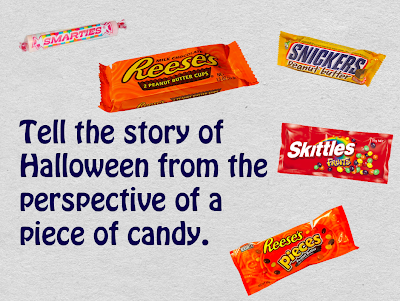Welcome to Creative
Writing!
Ø
Wednesday,
September 25th, 2013
When
You Come In
1.
Please
initial next to your name on the clipboard.
2.
Please
get a green packet and a white handout off the heater.
Portfolio Discussion Groups (Twenty Minutes)
1. Review the
paperwork—woo-hoo!
2. Get into your
groups.
3. Follow the
directions on the sheet!
Last Half of Class
1.
Writing
Buddies Preparation
2.
Print Autobio
Poem—Print second draft!
3.
Writing
Experiment #9
WE#9
- Please choose one of the following.
- Type for 400 words or more.
- MLA format for heading--yes!
- Doublespaced--yes!
- Print, front/back--yes!
- Due: Thursday, when class starts
AP English Peeps
Wednesday, September 25th,
2013
When
You Come In
1.
Please
sign in.
2.
Reminder: Impossible Thank-You Poem due w/final rubric
on Friday
3.
Reminder: 23,000 grains of free rice due Monday
4.
Vocab
Quiz Tomorrow
5.
CIRCLE UP, PLEASE!
Elegy for Jane” by
Theodore Roethke (p. 10)
1.
Yesterday
we listened to the poem out loud.
2.
We
read the definition of “elegy” (p. 10).
3.
We
grappled with the poem with our partner.
a.
Read
the poem aloud again.
b.
Annotate.
c.
Look
up and define words and references you don’t know. What are the words we looked up?
i. Pickerel (type of fish)
ii. Wren (songbird)
iii. Skittery (restless)
iv. Tendrils (spirals)
v. Spiney (prickly)
vi. Maimed (permanently damaged)
vii. Mould (soil)
4.
Let’s
hear those Reading Journal responses—remember to read straight from your
journal. In this way, you can hear if
you’re writing is clear and complete. If
you feel you need to elaborate, or explain your answer, or say, “What I meant
was…,” your writing probably isn’t clear and complete.
“Do Not Go Gentle Into That Good Night” on
page 13.
1.
Do
NOT listen to the poem at the link I gave you yet—seriously, don’t. I’ll tell you why.
2.
Do
answer the Reading Journal questions #1-#4.
a.
Use
complete, academic sentences.
b.
Use
THEY SAY (quotes from the poem).
c.
Use
I SAY (your interpretation).
11:05--Journal
Turn-In
1.
Flag your best
journal (quote response) with a post-it note.
2.
Open up our
shared comment doc, and type me several sentences explaining WHY I should read
this journal, of all the ones you’ve done.
What do you want me to see in your thinking or writing?
3.
Call it
“Strongest Journal, 9/25).
4.
Re-read all
your RJ responses from the last two weeks.
HIGHLIGHT your best RJ response.
In other words, if I was basing my assessment of your thinking on ONE RJ
response, which one would you have me read?
5.
Call this
entry, “Strongest RJ, 9/25”.
6.
Type me
several sentences explaining WHY I should read this. What do you want me to see in your thinking
or writing?
7.
Open your
journal to Free Write #1, and leave it open on my table when you take off
today. Thank you!
When You Finish
Ø
Study for the
quiz tomorrow.
Hello, CPR!
Wednesday,
September 25th, 2013
Class Ends at 9:15.
Renaissance
and Reformation Review
1.
Worksheet: European Renaissance and Reformation,
1300-1600
Ø Make
sure you correct your answers as you go, since this information will be on the
exam.
2.
Professor
Foster’s, “If It’s Square, It’s a Sonnet”
a.
Review
your annotations. Put a box around your
most important take-away from the chapter.
What are the most important take-aways?
i. The sentence is still chief in
importance.
ii. Read first with no cares—enjoy the
experience; second time, then you can pick it apart.
iii. Long doesn’t equal better; in a short
work, every word has to be perfect. It’s
harder to be brief!
b.
What
are the vocabulary words you looked up?
List them here:
i. Mnemonic—pattern of letters; advice;
ii. Myriad—man
iii. Versatile—able to adapt
iv. Ubiquitous—found everywhere
v. Astute—keen; clever
vi. Idiosyncratic—peculiar; distinctive
vii. Sagacity—wisdom
viii.
Placid—calm
ix. Suffice—to be enough
x. Hapless—unfortunate
xi. Trepidation—trembling fear; worry
xii. To Portend—to forecast; to warn; to signify
xiii.
Imminence--
xiv. Eminence--
3.
What
are the highlights from “Horrible Histories”?
List them for me now on our Study Guide.
4.
Poetry
Terms
Poetry
Explication
1.
Let’s
take a look at the poem you put together yesterday—Edmund Spenser’s Sonnet 75
(Amoretti LXXV: One Day I Wrote Her
Name)--Discussion
2.
TP-CASTT
(Fifteen minutes in Vocab War groups)
3.
“Sonnet
LXXIII”—William Shakespeare
Homework
Ø Study for your vocab quiz
Thursday.
Ø Free Rice = 23,000 for Monday



No comments:
Post a Comment